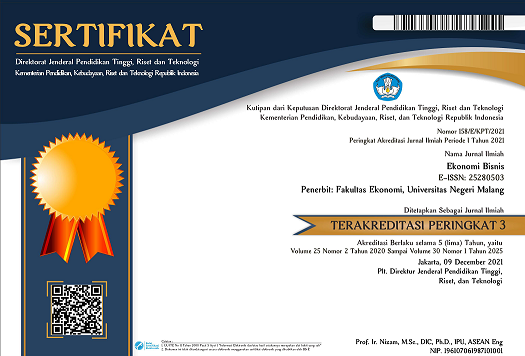WOMEN ENTREPRENEURS ON THE RISE: UNVEILING THE INTERPLAY BETWEEN GOALS-MOTIVATION, ORIENTATION AND OPPORTUNITY RECOGNITION AND PERFORMANCE
Abstract
Women entrepreneurs in Indonesia significantly contribute in national economy. Traditionally, Indonesian society has a tradition of believing that women have more responsibility for the household. This study investigates the effect of entrepreneurial orientation and entrepreneurial goals and motives on woman entrepreneur performance through opportunity recognition. Respondents in this study are 220 women entrepreneurs in from several provinces in Indonesia. This study chose the Partial Least Square-based Structural Equation (PLS-SEM) model technique to analyze the data. This study successfully confirmed the influence of entrepreneurial orientation on opportunity recognition in women entrepreneurs. However, the researcher could not show the effect of entrepreneurial goals and motives on opportunity recognition in women entrepreneurs. Furthermore, entrepreneurial orientation, entrepreneurial goals and motives, and opportunity recognition significantly influence women entrepreneur performance.
Full Text:
PDFReferences
Alam, S. S., Jani, M. F. M., & Omar, N. A. (2011). An empirical study of success factors of women entrepreneurs in southern region in Malaysia. International Journal of Economics and Finance, 3(2), 166–175.
Ataei, P., Karimi, H., & Zarei, R. (2024). The role of entrepreneurial leadership, intellectual capital, innovativeness culture, and entrepreneurial orientation in entrepreneurial opportunity recognition by students. Journal of Open Innovation: Technology, Market, and Complexity, 10(2), 100265. https://doi.org/https://doi.org/10.1016/j.joitmc.2024.100265
Bosma, N., Van Praag, M., Thurik, R., & De Wit, G. (2004). The value of human and social capital investments for the business performance of startups. Small Business Economics, 23, 227–236.
Carsrud, A., & Brännback, M. (2011). Entrepreneurial motivations: what do we still need to know? Journal of Small Business Management, 49(1), 9–26.
Chaudhuri, R., Datta, S. K., & Ghosh, S. (2012). When it Comes to Motivation of Entrepreneurs-a Few Issues. Productivity, 52(4), 208.
Chowdhury, M. S., Alam, Z., & Arif, M. I. (2013). Success factors of entrepreneurs of small and medium sized enterprises: Evidence from Bangladesh. Business and Economic Research, 3(2), 38.
Dess, G. G., & Lumpkin, G. T. (2005). The role of entrepreneurial orientation in stimulating effective corporate entrepreneurship. Academy of Management Perspectives, 19(1), 147–156.
Donbesuur, F., Boso, N., & Hultman, M. (2020). The effect of entrepreneurial orientation on new venture performance: Contingency roles of entrepreneurial actions. Journal of Business Research, 118, 150–161.
Elenurm, T., & Vaino, E. (2011). Interpretations of entrepreneurial success factors by female entrepreneurs and executives in a catch-up economy. ICSB World Conference Proceedings, 1.
Erogul, M. S., & Quagrainie, F. A. (2018). Conceptualising entrepreneurial orientation dimensions and female business performance in developing economies. Journal for International Business and Entrepreneurship Development, 11(2), 118–139.
Fatoki, O. O. (2011). The impact of human, social and financial capital on the performance of small and medium-sized enterprises (SMEs) in South Africa. Journal of Social Sciences, 29(3), 193–204.
Ferreira, J., Coelho, A., & Moutinho, L. (2020). Dynamic capabilities, creativity and innovation capability and their impact on competitive advantage and firm performance: The moderating role of entrepreneurial orientation. Technovation, 92, 102061.
Fuentes-Fuentes, M. del M., Bojica, A. M., & Ruiz-Arroyo, M. (2015). Entrepreneurial orientation and knowledge acquisition: effects on performance in the specific context of women-owned firms. International Entrepreneurship and Management Journal, 11, 695–717.
Ghozali, I., & Latan, H. (2015). Partial Least Squares : Konsep, Teknik, dan Aplikasi Menggunakan Program SmartPLS 3.0 (2 Edition). Badan Penerbit UNDIP.
Hasan, F. S. M. A., & Almubarak, M. M. S. (2016). Factors influencing women entrepreneurs’ performance in SMEs. World Journal of Entrepreneurship, Management and Sustainable Development, 12(2).
Hendriani, S., Efni, Y., & Tiyasiningsih, E. (2019). The effect of knowledge, entrepreneurship motives and the society’s culture in increasing the women micro business performance in Riau province. International Journal of Law and Management, 61(5/6), 563–574. https://doi.org/10.1108/IJLMA-12-2017-0297
Histiarini, A. R., Setyawan, A. A., Wajdi, M. F., & Wahyudi, H. D. (2017). Pengaruh Orientasi Kewirausahaan Dan Kemampuan Pada Kinerja Usaha Kecil Manufaktur. Jurnal Online UM Jember, 1(1), 29–44.
Idar, R., & Mahmood, R. (2011). Entrepreneurial and marketing orientation relationship to performance: The SME perspective.
Interdisciplinary Review of Economics and Management, 1(2), 1–8.
Karimi, A., & Rahmani, S. (2016). The influence of entrepreneurial orientation on business performance by the mediation process of knowledge creation (Case Study: Small and Medium Businesses).
Kobeissi, N. (2010). Gender factors and female entrepreneurship: International evidence and policy implications. Journal of International Entrepreneurship, 8, 1–35.
Li, Y.-H., Huang, J.-W., & Tsai, M.-T. (2009). Entrepreneurial orientation and firm performance: The role of knowledge creation process. Industrial Marketing Management, 38(4), 440–449.
Ming-Yen, T. W., & Siong-Choy, C. (2007). Theorising a framework of factors influencing performance of women entrepreneurs in Malaysia. Journal of Asia Entrepreneurship and Sustainability, 3(2), 1.
Mitchell, T. R., & Daniels, D. (2003). Observations and commentary on recent research in work motivation. Motivation and Work Behavior, 7(1), 225–254.
Mostafiz, I., & Goh, S.-K. (2018). International women entrepreneurs and international opportunity recognition skills for start-up ventures. Journal for International Business and Entrepreneurship Development, 11(3), 201–220.
Mozumdar, L., Materia, V. C., Hagelaar, G., Islam, M. A., Velde, G. van der, & Omta, S. W. F. (2022). Contextuality of entrepreneurial orientation and business performance: The case of women entrepreneurs in Bangladesh. Journal of Entrepreneurship and Innovation in Emerging Economies, 8(1), 94–120.
Mwaura, A. T. W., Gathenya, J. W. D., & Kihoro, J. (2015). Dynamics of entrepreneurial orientation on the performance of women owned enterprises in Kenya.
Nasip, S., Fabeil, N. F., Buncha, M. R., Hui, J. N. L., Sondoh, S. L., & Abd Halim, D. N. (2017). Influence of entrepreneurial orientation and social capital on business performance among women entrepreneurs along west coast Sabah Malaysia. Proceedings of International Conference on Economics, 377–393.
Nneka, A. A. (2015). Factors that affect the performance of women entrepreneurs in the micro scale enterprises in Southwestern Nigeria. The Business & Management Review, 6 (2), 30–31.
Pandian, K., & Jesurajan, V. (2011). An empirical investigation on the factors determining the success and problems faced by women entrepreneurs in Tiruchirapalli district–Tamilnadu. Interdisciplinary Journal of Contemporary Research in Business, 3(3), 914–922.
Ramos, L. A. G., Maldonado, E. R., & Hernández, E. F. M. (2014). Comparison of women entrepreneurs profiles in Coahuila, Mexico and San Juan, Puerto Rico. Global Conference on Business & Finance Proceedings, 9(2), 190.
Rauch, A., Wiklund, J., Lumpkin, G. T., & Frese, M. (2009). Entrepreneurial orientation and business performance: An assessment of past research and suggestions for the future. Entrepreneurship Theory and Practice, 33(3), 761–787.
Ribeiro, M. A., Adam, I., Kimbu, A. N., Afenyo-Agbe, E., Adeola, O., Figueroa-Domecq, C., & de Jong, A. (2021). Women entrepreneurship orientation, networks and firm performance in the tourism industry in resource-scarce contexts. Tourism Management, 86, 104343.
Rosmiati, M. (2015). Analisis Dan Perancangan E-Service Untuk Pelanggan Pada Jaya Bersama Konveksi. Jurnal Khatulistiwa Informatika, 1(1), 38–44.
Sanjaghi, M., Boozanjani, F., Zohoorian, I., & Doroodi, H. (2013). Examining the relationship between entrepreneurial orientation and organizational performance with the social exchange approach: The role of organizational justice. SSRN.
Sarason, Y., Dean, T., & Dillard, J. F. (2006). Entrepreneurship as the nexus of individual and opportunity: A structuration view. Journal of Business Venturing, 21(3), 286–305.
Shane, S. A. (2003). A general theory of entrepreneurship: The individual-opportunity nexus. Edward Elgar Publishing.
Shane, S., Locke, E. A., & Collins, C. J. (2003). Entrepreneurial motivation. Human Resource Management Review, 13(2), 257–279.
Shane, S., & Venkataraman, S. (2000). The promise of entrepreneurship as a field of research. Academy of Management Review, 25(1), 217–226.
Sisi, S. (2019). Studi Kinerja UMKM Ditinjau Dari Orientasi Pasar, Orientasi Kewirausahaan dan Inovasi: Kasus Pada Lokbin Kecamatan Cempaka Putih Jakarta Pusat. Jurnal Dinamika Manajemen Dan Bisnis, 2(2), 95–103.
Tanzil, S. N., Sunarya, E., & Jhoansyah, D. (2021). Role of Entrepreneurial Orientation and Market Orientation to MSMES Performance. Almana, 5(2), 141–147. https://doi.org/10.36555/almana.v5i2.1433
Townsend, D. M., & Harkins, J. A. (2005). CLAIRVOYANCE OR SOMETHING SINISTER: A MODEL OF MARKET INSIGHTS AND OPPORTUNITY RECOGNITION. Academy of Management Proceedings, 2005(1), R1–R6.
Wang, C. L. (2008). Entrepreneurial orientation, learning orientation, and firm performance. Entrepreneurship Theory and Practice, 32(4), 635–657.
Wang, Yonggui, & Zhang, X. (2008). Operationalization of corporate entrepreneurship and its performance implications in China: An empirical study. Journal of Chinese Entrepreneurship, 1(1), 8–20.
Wang, Yu‐Lin, Ellinger, A. D., & Jim Wu, Y. (2013). Entrepreneurial opportunity recognition: an empirical study of R&D personnel. Management Decision, 51(2), 248–266.
Wiklund, J., & Shepherd, D. (2005). Entrepreneurial orientation and small business performance: a configurational approach. Journal of Business Venturing, 20(1), 71–91.
Zeidan, S., & Bahrami, S. (2011). Women entrepreneurship in GCC: A framework to address challenges and promote participation in a regional context. International Journal of Business and Social Science, 2(14), 100–107.
DOI: http://dx.doi.org/10.17977/um042v28i3p32-40
Refbacks
- There are currently no refbacks.

This work is licensed under a Creative Commons Attribution-ShareAlike 4.0 International License.
Ekonomi Bisnis is licensed under a Creative Commons Attribution-ShareAlike 4.0 International License



